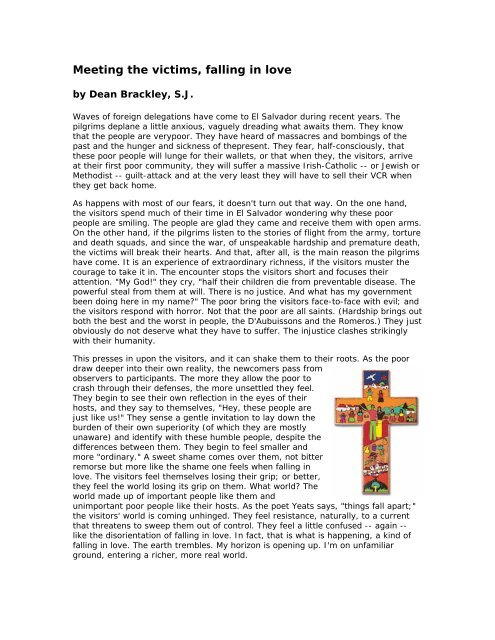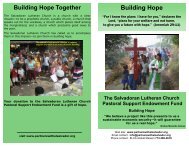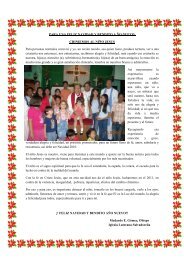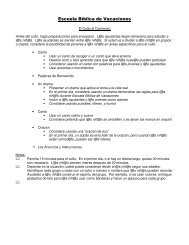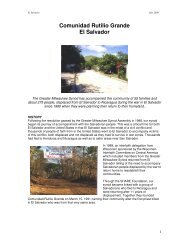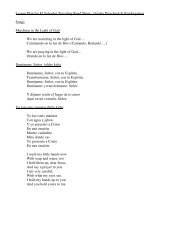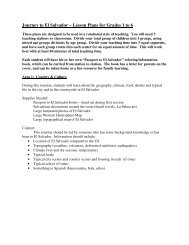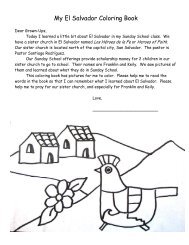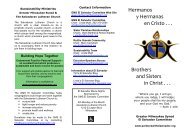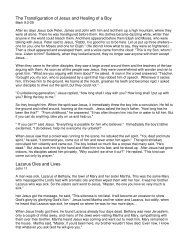Meeting the victims, falling in love - Partners with El Salvador
Meeting the victims, falling in love - Partners with El Salvador
Meeting the victims, falling in love - Partners with El Salvador
You also want an ePaper? Increase the reach of your titles
YUMPU automatically turns print PDFs into web optimized ePapers that Google loves.
<strong>Meet<strong>in</strong>g</strong> <strong>the</strong> <strong>victims</strong>, <strong>fall<strong>in</strong>g</strong> <strong>in</strong> <strong>love</strong><br />
by Dean Brackley, S.J.<br />
Waves of foreign delegations have come to <strong>El</strong> <strong>Salvador</strong> dur<strong>in</strong>g recent years. The<br />
pilgrims deplane a little anxious, vaguely dread<strong>in</strong>g what awaits <strong>the</strong>m. They know<br />
that <strong>the</strong> people are verypoor. They have heard of massacres and bomb<strong>in</strong>gs of <strong>the</strong><br />
past and <strong>the</strong> hunger and sickness of <strong>the</strong>present. They fear, half-consciously, that<br />
<strong>the</strong>se poor people will lunge for <strong>the</strong>ir wallets, or that when <strong>the</strong>y, <strong>the</strong> visitors, arrive<br />
at <strong>the</strong>ir first poor community, <strong>the</strong>y will suffer a massive Irish-Catholic -- or Jewish or<br />
Methodist -- guilt-attack and at <strong>the</strong> very least <strong>the</strong>y will have to sell <strong>the</strong>ir VCR when<br />
<strong>the</strong>y get back home.<br />
As happens <strong>with</strong> most of our fears, it doesn't turn out that way. On <strong>the</strong> one hand,<br />
<strong>the</strong> visitors spend much of <strong>the</strong>ir time <strong>in</strong> <strong>El</strong> <strong>Salvador</strong> wonder<strong>in</strong>g why <strong>the</strong>se poor<br />
people are smil<strong>in</strong>g. The people are glad <strong>the</strong>y came and receive <strong>the</strong>m <strong>with</strong> open arms.<br />
On <strong>the</strong> o<strong>the</strong>r hand, if <strong>the</strong> pilgrims listen to <strong>the</strong> stories of flight from <strong>the</strong> army, torture<br />
and death squads, and s<strong>in</strong>ce <strong>the</strong> war, of unspeakable hardship and premature death,<br />
<strong>the</strong> <strong>victims</strong> will break <strong>the</strong>ir hearts. And that, after all, is <strong>the</strong> ma<strong>in</strong> reason <strong>the</strong> pilgrims<br />
have come. It is an experience of extraord<strong>in</strong>ary richness, if <strong>the</strong> visitors muster <strong>the</strong><br />
courage to take it <strong>in</strong>. The encounter stops <strong>the</strong> visitors short and focuses <strong>the</strong>ir<br />
attention. "My God!" <strong>the</strong>y cry, "half <strong>the</strong>ir children die from preventable disease. The<br />
powerful steal from <strong>the</strong>m at will. There is no justice. And what has my government<br />
been do<strong>in</strong>g here <strong>in</strong> my name?" The poor br<strong>in</strong>g <strong>the</strong> visitors face-to-face <strong>with</strong> evil; and<br />
<strong>the</strong> visitors respond <strong>with</strong> horror. Not that <strong>the</strong> poor are all sa<strong>in</strong>ts. (Hardship br<strong>in</strong>gs out<br />
both <strong>the</strong> best and <strong>the</strong> worst <strong>in</strong> people, <strong>the</strong> D'Aubuissons and <strong>the</strong> Romeros.) They just<br />
obviously do not deserve what <strong>the</strong>y have to suffer. The <strong>in</strong>justice clashes strik<strong>in</strong>gly<br />
<strong>with</strong> <strong>the</strong>ir humanity.<br />
This presses <strong>in</strong> upon <strong>the</strong> visitors, and it can shake <strong>the</strong>m to <strong>the</strong>ir roots. As <strong>the</strong> poor<br />
draw deeper <strong>in</strong>to <strong>the</strong>ir own reality, <strong>the</strong> newcomers pass from<br />
observers to participants. The more <strong>the</strong>y allow <strong>the</strong> poor to<br />
crash through <strong>the</strong>ir defenses, <strong>the</strong> more unsettled <strong>the</strong>y feel.<br />
They beg<strong>in</strong> to see <strong>the</strong>ir own reflection <strong>in</strong> <strong>the</strong> eyes of <strong>the</strong>ir<br />
hosts, and <strong>the</strong>y say to <strong>the</strong>mselves, "Hey, <strong>the</strong>se people are<br />
just like us!" They sense a gentle <strong>in</strong>vitation to lay down <strong>the</strong><br />
burden of <strong>the</strong>ir own superiority (of which <strong>the</strong>y are mostly<br />
unaware) and identify <strong>with</strong> <strong>the</strong>se humble people, despite <strong>the</strong><br />
differences between <strong>the</strong>m. They beg<strong>in</strong> to feel smaller and<br />
more "ord<strong>in</strong>ary." A sweet shame comes over <strong>the</strong>m, not bitter<br />
remorse but more like <strong>the</strong> shame one feels when <strong>fall<strong>in</strong>g</strong> <strong>in</strong><br />
<strong>love</strong>. The visitors feel <strong>the</strong>mselves los<strong>in</strong>g <strong>the</strong>ir grip; or better,<br />
<strong>the</strong>y feel <strong>the</strong> world los<strong>in</strong>g its grip on <strong>the</strong>m. What world? The<br />
world made up of important people like <strong>the</strong>m and<br />
unimportant poor people like <strong>the</strong>ir hosts. As <strong>the</strong> poet Yeats says, "th<strong>in</strong>gs fall apart;"<br />
<strong>the</strong> visitors' world is com<strong>in</strong>g unh<strong>in</strong>ged. They feel resistance, naturally, to a current<br />
that threatens to sweep <strong>the</strong>m out of control. They feel a little confused -- aga<strong>in</strong> --<br />
like <strong>the</strong> disorientation of <strong>fall<strong>in</strong>g</strong> <strong>in</strong> <strong>love</strong>. In fact, that is what is happen<strong>in</strong>g, a k<strong>in</strong>d of<br />
<strong>fall<strong>in</strong>g</strong> <strong>in</strong> <strong>love</strong>. The earth trembles. My horizon is open<strong>in</strong>g up. I'm on unfamiliar<br />
ground, enter<strong>in</strong>g a richer, more real world.
We all live a bit on <strong>the</strong> periphery of <strong>the</strong> deep drama of life, more so, on average, <strong>in</strong><br />
affluent societies. The reality of <strong>the</strong> periphery is th<strong>in</strong>, one-dimensional, "lite,"<br />
compared to <strong>the</strong> multilayered richness of this new world <strong>the</strong> visitors are enter<strong>in</strong>g. In<br />
this <strong>in</strong>terchange <strong>with</strong> a few of <strong>the</strong>ir representatives, <strong>the</strong> anonymous masses of <strong>the</strong><br />
world's poor emerge from <strong>the</strong>ir cardboard-cutout reality and take on <strong>the</strong> threedimensional<br />
status of full-fledged human be<strong>in</strong>gs.<br />
Actually, <strong>the</strong>re are more than three dimensions here. The eyes of <strong>the</strong> victim beckon.<br />
They are like a bottomless well <strong>in</strong> which someth<strong>in</strong>g <strong>in</strong>f<strong>in</strong>ite draws me on. In <strong>the</strong>ir<br />
welcome, peace sweeps over me. I feel almost at home <strong>in</strong> this strange place.<br />
Although an accomplice to <strong>the</strong> world of important people like me and unimportant<br />
people like <strong>the</strong>m, I feel accepted, forgiven -- even before I have cleaned up my act<br />
<strong>with</strong> <strong>the</strong>m or billions like <strong>the</strong>m.<br />
After reflect<strong>in</strong>g on <strong>the</strong>se issues for some years, it only gradually dawned on me that<br />
I belong to a peculiar tribe. The middle-class cultures of <strong>the</strong> North are newcomers to<br />
world history and have only existed for about 200 years. We're not all bad people,<br />
we're just a t<strong>in</strong>y m<strong>in</strong>ority under <strong>the</strong> common illusion that we are <strong>the</strong> center of gravity<br />
of <strong>the</strong> universe. The poor can free us from this strange idea.<br />
Don't get me wrong. The middle-class cultures have made extraord<strong>in</strong>ary advances <strong>in</strong><br />
civilization. True; many came at great cost to <strong>the</strong> despoiled nations and races. Still,<br />
<strong>the</strong>se are historic achievements. And I'm not even talk<strong>in</strong>g about ambiguous<br />
technological progress. I mean <strong>the</strong> spiritual, cultural and political breakthroughs: <strong>the</strong><br />
unheard-of opportunities, political liberties, democracy, <strong>the</strong> critical consciousness of<br />
<strong>the</strong> Enlightenment, and all that. No need to demean <strong>the</strong>se ga<strong>in</strong>s. The problem for us<br />
is that <strong>the</strong> new freedoms and economic security have distanced <strong>the</strong> non-poor from<br />
<strong>the</strong> k<strong>in</strong>d of daily life-and-death struggle that has been <strong>the</strong> daily fare of <strong>the</strong> poor of all<br />
times right up to today. Maybe 90 percent of all <strong>the</strong> people who ever lived have<br />
struggled every day to keep <strong>the</strong> household alive aga<strong>in</strong>st <strong>the</strong> threat of death through<br />
hunger, disease, accidents and violence. By distanc<strong>in</strong>g <strong>the</strong> non-poor from <strong>the</strong> daily<br />
threat of death, <strong>the</strong> benefits of modernity have <strong>in</strong>duced <strong>in</strong> us a k<strong>in</strong>d of chronic lowgrade<br />
confusion about what is really important <strong>in</strong> life, namely life itself and <strong>love</strong>.<br />
Besides, superior technology and <strong>the</strong> communications media <strong>in</strong>duce us to th<strong>in</strong>k of<br />
our culture and perspective on life as <strong>the</strong> norm, and basically on track. The<br />
encounter <strong>with</strong> <strong>the</strong> poor stops us short; it recollects us. When we come out on <strong>the</strong><br />
o<strong>the</strong>r side, we realize that <strong>the</strong> marg<strong>in</strong>alized are actually at <strong>the</strong> center of th<strong>in</strong>gs. It is<br />
we, <strong>in</strong> Wash<strong>in</strong>gton and Paris, who are on <strong>the</strong> fr<strong>in</strong>ge.<br />
These people shake us up because <strong>the</strong>y br<strong>in</strong>g home to us that th<strong>in</strong>gs are much<br />
worse <strong>in</strong> <strong>the</strong> world than we dared to imag<strong>in</strong>e. But that is only one side of <strong>the</strong> story:<br />
If we allow <strong>the</strong>m to share <strong>the</strong>ir suffer<strong>in</strong>g <strong>with</strong> us, <strong>the</strong>y communicate some of <strong>the</strong>ir<br />
hope to us as well. The smile that seems to have no foundation <strong>in</strong> <strong>the</strong> facts is not<br />
phony; <strong>the</strong> spirit of fiesta is not an escape but a recognition that someth<strong>in</strong>g else is<br />
go<strong>in</strong>g on <strong>in</strong> <strong>the</strong> world besides <strong>in</strong>justice and destruction. The poor smile because <strong>the</strong>y<br />
suspect that this someth<strong>in</strong>g is more powerful than <strong>the</strong> <strong>in</strong>justice. When <strong>the</strong>y <strong>in</strong>sist on<br />
shar<strong>in</strong>g <strong>the</strong>ir tortilla <strong>with</strong> a visit<strong>in</strong>g gr<strong>in</strong>go, we recognize <strong>the</strong>re is someth<strong>in</strong>g go<strong>in</strong>g on<br />
<strong>in</strong> <strong>the</strong> world that is more wonderful than we dared to imag<strong>in</strong>e.<br />
It seems that <strong>the</strong> victim offers us <strong>the</strong> privileged place (although not <strong>the</strong> only place)<br />
to encounter <strong>the</strong> truth which sets us free. The poor usher us <strong>in</strong>to <strong>the</strong> heart of reality.<br />
They br<strong>in</strong>g us up aga<strong>in</strong>st <strong>the</strong> world and ourselves all at once. To some extent, we all<br />
hold reality at arm's length -- fend<strong>in</strong>g off <strong>in</strong>tolerable parts of <strong>the</strong> world <strong>with</strong> one hand<br />
and <strong>in</strong>tolerable parts of ourselves <strong>with</strong> <strong>the</strong> o<strong>the</strong>r. The two go toge<strong>the</strong>r. As a rule, our
encounters <strong>with</strong> <strong>the</strong> world place us <strong>in</strong> touch <strong>with</strong> <strong>in</strong>ternal reality, as well. In<br />
particular, when <strong>the</strong> world's pa<strong>in</strong> crashes <strong>in</strong> upon us <strong>in</strong> <strong>the</strong> person of <strong>the</strong> victim, <strong>the</strong><br />
encounter dredges up from <strong>with</strong><strong>in</strong> us <strong>the</strong> parts of ourselves that we had banished.<br />
The outcast outside us calls forth <strong>the</strong> outcast <strong>with</strong><strong>in</strong> us. This is why people avoid <strong>the</strong><br />
poor. But meet<strong>in</strong>g <strong>the</strong>m can heal us. We will only heal our <strong>in</strong>ner divisions if we are<br />
also work<strong>in</strong>g to heal our social divisions.<br />
The <strong>victims</strong> of history -- <strong>the</strong> destitute, abused women, oppressed m<strong>in</strong>orities, all<br />
those <strong>the</strong> Bible calls "<strong>the</strong> poor" -- not only put us <strong>in</strong> touch <strong>with</strong> <strong>the</strong> world and <strong>with</strong><br />
ourselves, but also <strong>with</strong> <strong>the</strong> mercy of God. There is someth<strong>in</strong>g fathomless about <strong>the</strong><br />
encounter <strong>with</strong> <strong>the</strong> poor, as we have said -- like <strong>the</strong> open<strong>in</strong>g of a chess game <strong>with</strong> its<br />
<strong>in</strong>f<strong>in</strong>ite possibilities. If we let <strong>the</strong>m, <strong>the</strong> poor will place us before <strong>the</strong> abyss of <strong>the</strong><br />
holy Mystery we call God. They are a k<strong>in</strong>d of door that opens before that Mystery and<br />
through which God passes to get at us. Clearly we need <strong>the</strong>m more than <strong>the</strong>y need<br />
us.<br />
Small wonder that people keep return<strong>in</strong>g. Someth<strong>in</strong>g has happened, a k<strong>in</strong>d of <strong>fall<strong>in</strong>g</strong><br />
<strong>in</strong> <strong>love</strong>, I th<strong>in</strong>k.


